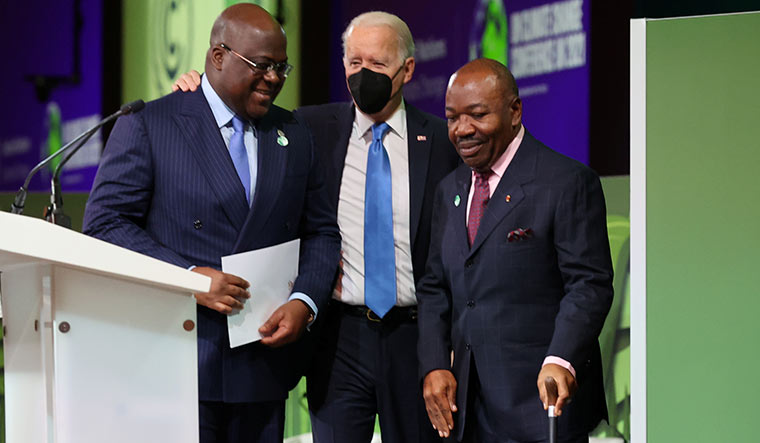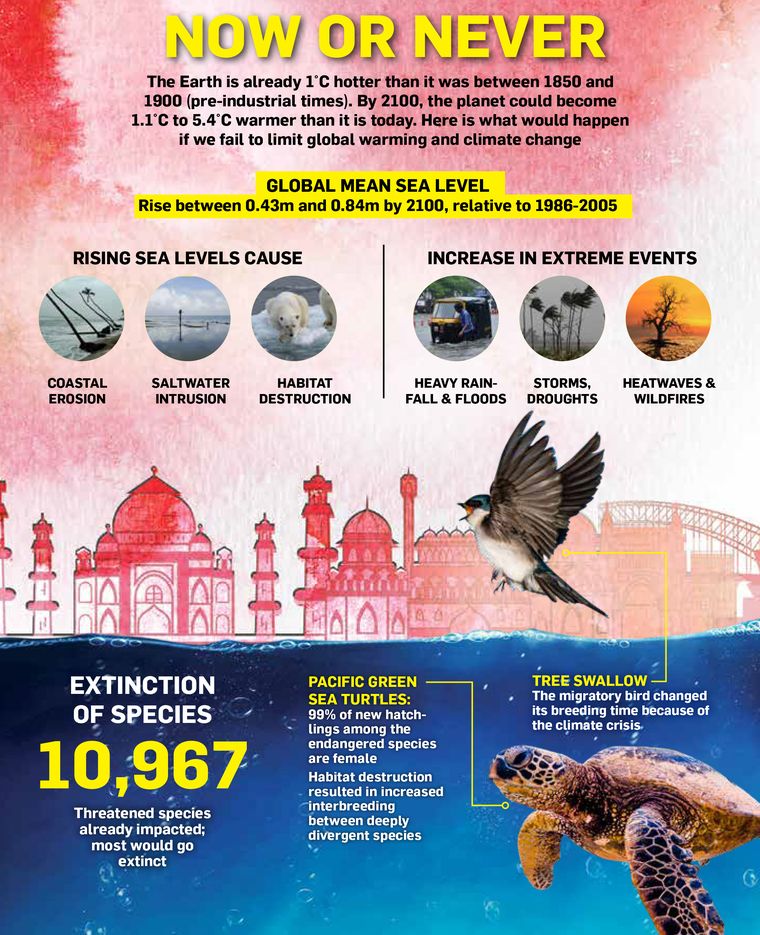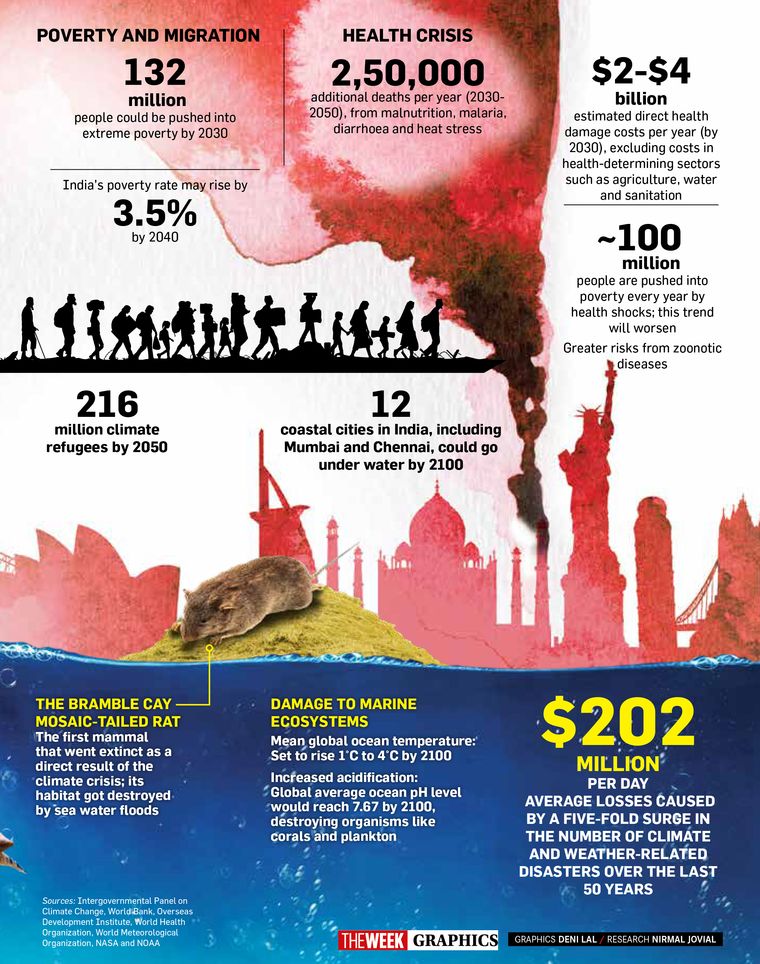It was a closely guarded secret, and officials in the environment ministry threw red herrings all the time. While almost everyone knew Prime Minister Narendra Modi would make a big announcement, true to style, in Glasgow, there was speculation on what this would be. Would he talk about India’s Energy Swaraj by 2047 as the additional commitment or would the transcontinental solar global green grid be the big thing? So, when he announced India’s commitment to reach net-zero (emissions) by 2070, everyone did a double take. India had finally bitten the bullet, or had it? Modi’s speech was in the late afternoon when a certain drowsiness had enveloped the summit, and not just US President Joe Biden. The announcement roused everyone into exclamations and discussions, and it remained the biggest buzz at the World Leaders Summit at the United Nations Conference of the Parties (COP26), putting aside the doomsday prophecies that were earlier dominating the narrative.
The year 2070 is half a century away, and two decades behind the global north’s clarion of a 2050 deadline; none of the leaders of today are likely to be around then to call each other out. Yet, Modi’s big announcement, along with a slew of others—with 2030 as the deadline for a 45 per cent less carbon-intensive economy, a 50 per cent renewable component in the energy mix and the Indian Railways going totally powered by renewables—brought in relieved praise from India’s bilateral buddy and COP26 host, the United Kingdom. It was a commitment they wanted to this new fancy of theirs, net-zero emissions. Though India has maintained that net-zero emissions alone do not solve the climate crisis, it made the needed commitment.
India’s 2070 target seems ridiculous and unambitious at first, but it might actually be closer to being met than the bigger claims other nations have given. Modi’s announcement is ambiguous on whether the net-zero is for carbon emissions or all greenhouse gases, but there is no ambiguity in the trajectory India has taken towards tackling climate change. As Modi pointed out once again, it is the only G20 country on track to meet the commitments it had made in Paris in 2015. “Countries like ours cannot stick to western deadlines; none of us in south Asia can think of removing coal anytime soon; we have to set targets doable for us,” noted Ahmad Kamruzzaman Majumder, an environmental science professor from Dhaka.
“We are a global force in carbon emissions, we need to have a plan to bring it down. Yet, given India’s so far rigid stance against net neutrality, the announcement did come as a surprise,” said Anjal Prakash, lead author of the sixth assessment report of the Intergovernmental Panel on Climate Change. “Since China had given a 2060 deadline, India’s 2070 is natural, though we, too, could have accelerated it by a decade.”
Sunita Narain, director, Centre for Science and Environment, said that given India’s comparatively low per capita contribution to global emissions and the energy needs of the country, we did not have to make these announcements, but we did, and now this should be a challenge to the already rich world to step up their act. She said that India’s net-zero target matched the commitment of the already industrialised countries, but for the world to reach the 2050 deadline, the west should get there by 2030 and China by 2040.
Speaking, as he said, on behalf of the developing world, Modi took up the issue of climate financing. While other leaders made emphatic reminders of the $100 billion commitment pledged a dozen years ago by the developed world, Modi took it a step further, demanding a scale-up of the climate finance ambition in return for scaled-up climate action commitments. India alone needs a trillion US dollars at the earliest, he said. The demand from countries to see the pledged finances on the table reached a crescendo over the two days of the leaders’ summit. Will it shame the developed world into reaching for their wallets finally? They are realising that the pledge has now become an issue of their sincerity to the cause of climate.
French President Emmanuel Macron called the $100 billion fund delivery the second big objective of the summit, the first being the scaled-up ambition to keep temperature rise within 1.5°C of the pre-industrialised normal. In Paris, in 2015, the consensus was to keep the outer limit at 2°C. The new target means bringing down greenhouse gas emissions even more rapidly now.
Finances aside, the sincerity of the rich is under question as they often stray away from the talk. UK Prime Minister Boris Johnson is a late but enthusiastic entrant to climate concern, but his demands that the world do more are being juxtaposed against his own domestic decisions—giving subsidies to domestic flights, and even the assessment for a new colliery in Cumbria even as the UK announced it would not finance coal projects overseas. Biden announced a quadrupling of US funds for the $100 billion pledge, launched a Build Back Better roundtable and spoke about the American “obligation to help” other countries in making a clean energy transition. The impunity with which the US walks out and back into treaties with leadership changes, however, does not inspire hope in continuity.
The many fractures in the world became apparent as around 120 world leaders gathered together. While the poorer nations called out their richer cousins over the money and technology they had promised but did not give, within the developed world itself, the squabbling became personal. Macron and Australian Prime Minister Scott Morrison continued their rancour from Rome, where they reportedly came down to name-calling. France cannot forgive Australia for rejecting their submarine deal and ganging up with the British and Americans as AUKUS. Macron and Johnson shared an uneasy body language, too, though their squabble over fishing in the English Channel finally de-escalated when France decided to withhold sanctions against British fish exports for the present. This tiff underscored the zealousness with which nations protect their natural resources from others. Will they be able to win against climate change, too? China called out the organisers for deliberately scuttling President Xi Jinping’s address. Biden accused big emitters, China and Russia, of walking out of climate change, conveniently forgetting US behaviour under Donald Trump. Turkey’s Recep Tayyip Erdogan decided to skip the event at the last moment; no explanations were given.
It was not surprising then that the youth, both within the venue as well as outside, felt that the leaders were not sincere about climate change. Youth icon and climate crusader Greta Thunberg, who was not invited to the meet, had crowds thronging her event in the city, where she sang a string of swear words against politicians. Just how it helped the cause of climate change remains unclear. Within the event, India Logan-Riley, a Maori climate activist from New Zealand, said, “I am the same age as the negotiations. I have grown up, graduated, have fallen in love and out of it, all while the global north fudges with the future.”
The climate in Glasgow is certainly fraught. What will emerge from the remaining days of negotiations? A new mantra? Some diplomatically cobbled consensus like the document that emerged from the G20 meet, and which does not really say much? COP26 president Alok Sharma said that while Paris pledged, Glasgow must deliver. Deliver ‘what’, however, remains the question. Carbon cut? Or, could he have meant cash and tech?





